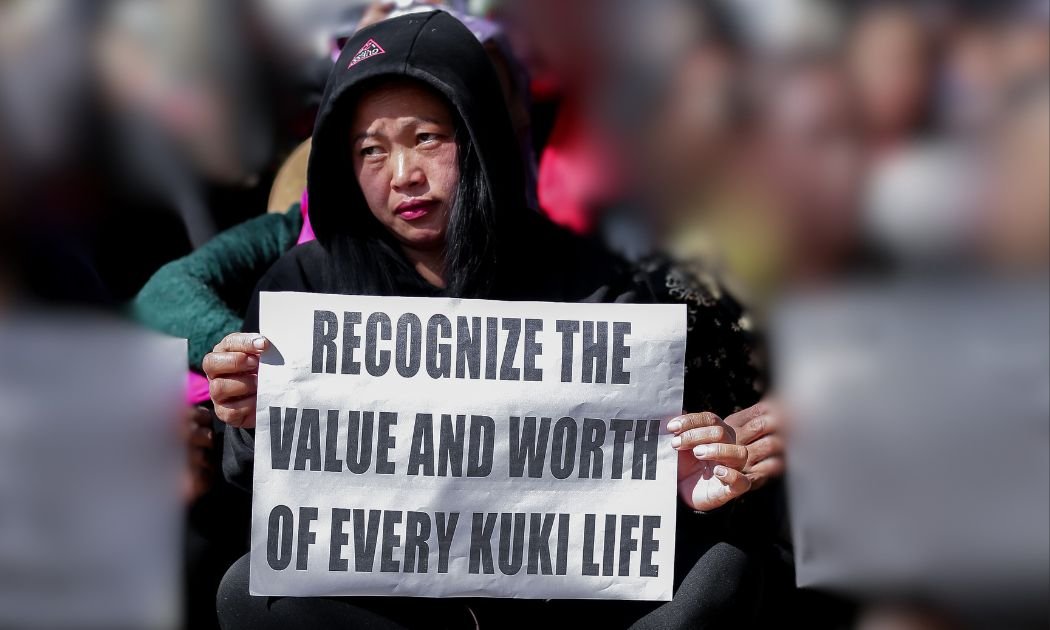Manipur Violence: Forensic Report on Tapes Alleging CM Biren Singh’s Role Ordered
State Allegedly Attempts to Arrest Supreme Court Case Petitioner
February 3, 2025A Kuki-Zo woman protester / Photo by Thingkho Le Malcha
The Supreme Court has ordered a forensic report on audio tapes allegedly linking Chief Minister N. Biren Singh to ethnic violence in Manipur. The state government is allegedly seeking to arrest the petitioner who raised these allegations before the court.
The Supreme Court bench comprising Chief Justice of India Sanjiv Khanna and Justice Sanjay Kumar on Feb. 3 sought a sealed forensic lab report from the Central Forensic Science Laboratory on audio tapes said to feature Chief Minister Singh encouraging ethnic violence in Manipur, as reported by LiveLaw.
Advocate Prashant Bhushan, who represents the petitioner, said these tapes were initially examined by an independent entity identified as “Truth Labs,” which confirmed with over 93% certainty that the voice belongs to the Chief Minister.
The petitioner, according to the court documents, drew attention to statements on the tapes suggesting that particular groups received permission to acquire weapons from the State armoury.
The petitioner’s legal team has also indicated that the recordings imply promises of protection from arrest for those involved.
The Solicitor General of India, appearing for the State, told the court that the petitioner should initially approach the High Court (in Manipur) for any legal relief. The Solicitor General also informed the bench that a First Information Report (FIR) has been lodged regarding the matter, and investigations have begun.
The Court has reportedly scheduled the matter for the week starting March 24, 2025. The bench stated that the report should be produced in a sealed cover.
The arguments in the Supreme Court followed assertions that a person who attended a closed-door session had recorded the Chief Minister’s remarks. These recordings were later disclosed on various platforms, prompting legal scrutiny and leading to a call for an official forensic examination.
While proceedings continue in court, the Kuki-Zo Council and the Kuki Students’ Organisation have expressed concern that the state government is seeking to arrest the individual who filed the Supreme Court petition.
In a statement, the Kuki-Zo Council said the Manipur police was “hounding” the individual, identified as H.S. Benjamin Mate, the Chairman of the Kuki Organisation for Human Rights Trust, to “obstruct the course of justice by trying to arrest the petitioner of the case.”
The statement warned that this development could deter future petitioners from coming forward, especially in cases involving public figures.
The Manipur government has dismissed the audio as “doctored,” asserting that the claims of it being Singh’s voice are false.
The recording was brought into the public domain in August 2024 by The Wire after being officially submitted to the inquiry commission weeks earlier.
On Sept. 4, 2024, Advocate Bhushan had sent a detailed letter to the official Commission of Inquiry into Manipur Violence, 2023, chaired by Justice Ajai Lamba, along with a 48-minute audio recording as a critical piece of evidence, seeking an FIR against the Chief Minister.
According to Bhushan, the recording includes admissions by Singh of using heavy bombs and arms looted from state armouries against the Kuki-Zo-dominated areas. His letter alleged that state forces and machinery, under Singh’s direction, were involved in perpetuating violence against the Kuki-Zo community. It added that his actions allegedly supported terrorists and anti-social elements in escalating the conflict and obstructed justice in cases involving rape and other atrocities committed against the Kuki-Zo people.
Manipur is home to three main ethnic communities: the majority Meitei people, who live in the Imphal valley, and the Kuki-Zo and Naga tribes, who inhabit the surrounding hills.
The violence in Manipur began weeks after an April 2023 directive from the Manipur High Court, which seemed to suggest granting tribal status to the majority Meitei community. This status would allow them to purchase land in the hills, traditionally inhabited by the Kuki-Zo tribes, sparking fears among the Kuki-Zo of losing their ancestral lands.

